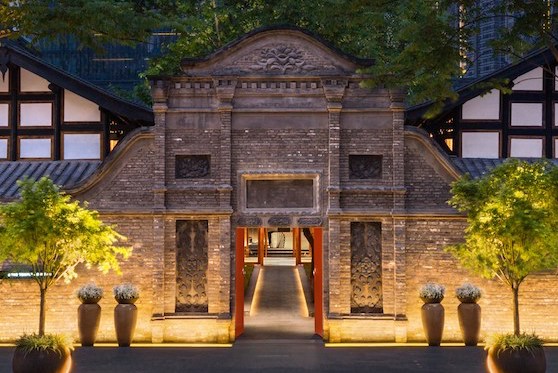Kurt Macher, general manager of Swire Hotels’ The Temple House in Chengdu, China, chatted with HOTELS about the operational challenges of implementing sustainable practices. The Temple House is itself a sort of conservation project – parts of the 100-room hotel are set within a Chinese courtyard building adjacent to the thousand-year-old Daci Temple.

HOTELS: In your years as general manager, at different properties and brands across the world, what do you make of the hotel industry’s new pushes towards sustainability?
Kurt Macher: I am very happy about this. Especially as an Austrian, where I was taught in school in the ’80s the importance of sustainability and how to protect the environment, especially in Austria, a very small country. Hotels have a lot of power to encourage the community to become greener and look after Planet Earth better.
At The Temple House we combine sustainability and Christmas each year, and our main Christmas tree is made out of recycled or up-cycled materials. In 2016 we used 3,000 wine bottles, in 2017 8,000 metal candle holders left over from Daci Temple and this year, an up-cycled plastic Temple House water bottle tree (with 2,500 bottles) bedazzled with a thousand up-cycled Swarovski crystals – a great collaboration. Furthermore, we used hundreds of thousands of leftover plastic drinking straws to create Christmas trees and décor in our Jing Bar and The Temple Café since we no longer use plastic straws and had to empty out the store rooms. We wanted to show the community you can make something so beautiful out of something bad and further increase awareness of using plastic alternatives. We are currently working on several initiatives on how to minimize plastic in guest rooms to the bare minimum to follow our MI XUN Spa and Gym that are already plastic-free.
H: What are the operational challenges in putting these sustainable initiatives in place at the property level?
KM: In China it is difficult to recycle because not enough strict measurements or systems are in place yet to ensure controlled recycling. So the best way is not to use certain products. Right now we are focused on reducing the usage of plastic so it cannot harm the environment, since most of the plastic is getting dumped in our oceans, which is harmful for the sea environment and ocean animals. It is a good challenge and we hope we can really inspire more guests to reduce their usage of plastic.
We also empower our employees with education so they can inspire their friends and families. For example, we gave out reusable coffee/tea drink containers and we have a policy called “no cup, no coffee,” so they don’t get coffee from our café without this cup. Also, we gave out reusable Temple House Shopping bags to all team members to encourage them not to use plastic bags that are given out at grocery stores. We introduced car-sharing with the team members to reduce car air pollution.
H: Can you speak even just generally about the return on investment for sustainable practices? Are the costs mostly being recouped or is it one of those things where it’s worth the extra expense?
KM: The ROI is difficult to measure. We track the usage of energy, water and food waste, which helps to reduce costs. We compare consumptions and have been doing a good job in reducing it year over year. Of course, some initiatives might cost a bit more. For example, we are using rice paper to wrap all bathroom amenities now instead of plastic, but it’s worth it and we hope with all our green initiatives we can encourage our guests to focus more on sustainability in their own daily lives as well.

